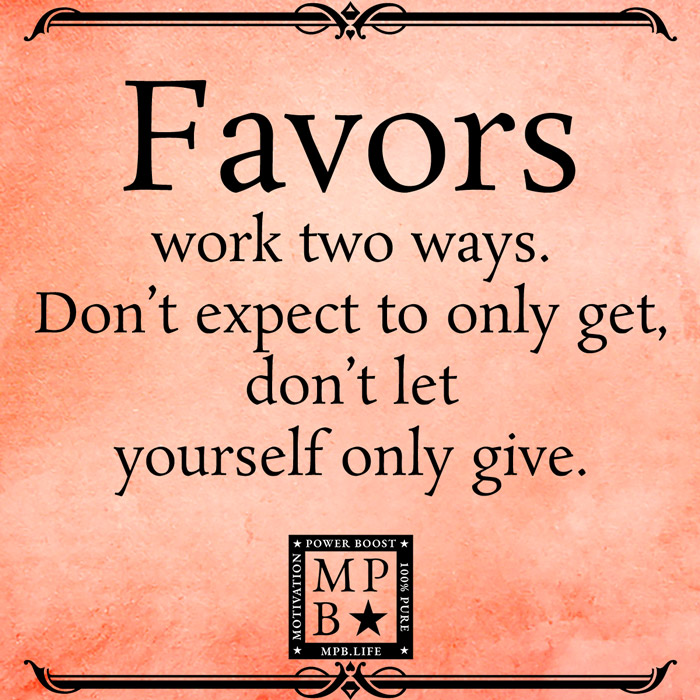
Favors Work Two Ways Graphic © motivationpowerboost.com
Favors work two ways.
Don’t expect to only get.
Don’t let yourself only give.
Navigating the Delicate Balance of Giving and Receiving
Life is a complex interplay of relationships, interactions, and exchanges. One of the most fundamental aspects of human connection is the concept of favors – those acts of kindness, support, or assistance that we bestow upon others and, in turn, hope to receive when we are in need. However, as the saying goes, “Favors work two ways. Don’t expect to only get; don’t let yourself only give.”
This profound statement encapsulates the delicate balance we must strike in our interpersonal dealings. It serves as a reminder that healthy relationships are built on a foundation of reciprocity and mutual support. When we consistently find ourselves on either extreme of the spectrum – always giving or always taking – we risk creating an imbalance that can strain even the strongest of bonds.
On one hand, it is essential to cultivate a generous spirit and a willingness to lend a helping hand to those around us. Acts of kindness, no matter how small, have the power to brighten someone’s day, ease their burdens, and foster a sense of community. By extending ourselves to others, we contribute to a positive and supportive environment that benefits everyone.
However, it is equally important to recognize that we cannot pour from an empty cup. Constantly giving without replenishing our own reserves can lead to burnout, resentment, and a sense of being taken for granted. It is not selfish to have boundaries and to expect reciprocity in our relationships. In fact, it is a sign of self-respect and emotional intelligence.
The key lies in finding a harmonious equilibrium between giving and receiving. This requires open communication, self-awareness, and a willingness to assert our own needs and boundaries when necessary. It means being attuned to the dynamics of our relationships and ensuring that there is a balanced flow of support and consideration.
By embracing this philosophy, we create healthier, more resilient connections with those around us. We learn to appreciate the gifts we receive and to express gratitude for the kindness of others. At the same time, we become more mindful of the impact of our own actions and strive to be a source of support and encouragement to those in our lives.
In a world that often emphasizes self-interest and individualism, the reminder that favors work two ways is a powerful call to nurture our interconnectedness. It encourages us to build a society based on mutual care, empathy, and shared responsibility. By striking the right balance between giving and receiving, we not only enrich our own lives but also contribute to a more compassionate and supportive world for all.
Fostering Reciprocity through Conscious Communication
One critical aspect of maintaining a healthy balance between giving and receiving is conscious communication. Open and honest dialogue is essential for establishing clear boundaries, expressing needs, and fostering a mutual understanding within our relationships.
Too often, we assume that others can read our minds or that our needs are self-evident. However, this lack of direct communication can lead to misunderstandings, unmet expectations, and resentment. By taking a proactive approach and openly discussing our desires, limitations, and concerns, we create an environment of transparency and trust.
Effective communication involves not only expressing our own perspectives but also actively listening to those around us. We must be willing to hear and consider the viewpoints of others, even when they differ from our own. This empathetic approach allows us to better understand the needs and motivations of our loved ones, colleagues, and friends, enabling us to find mutually beneficial solutions.
Moreover, conscious communication extends beyond the immediate exchange of words. It encompasses our actions and behaviors, which can speak volumes about our intentions and values. By aligning our words with our deeds, we demonstrate authenticity and consistency, reinforcing the trust and respect within our relationships.
Ultimately, by prioritizing conscious communication, we take an active role in shaping the dynamics of our relationships. We can address imbalances before they become deeply entrenched, and we can work collaboratively to create a supportive and nurturing environment where both giving and receiving are valued and respected.
Related Inspirational Quotes
“He who does not give some portion of his wealth away while he is alive must not expect to enjoy it long after he is gone.” – Ali ibn Abi Talib
“Fair exchange is no robbery.” – Thomas Fuller
“You cannot hope to build a better world without improving the individuals themselves.” – Marie Curie
“The highest form of worship is the worship of divine ideals embodied in human society.” – Sarvepalli Radhakrishnan
“No person is your friend who demands your silence, or denies your right to grow.” – Alice Walker
